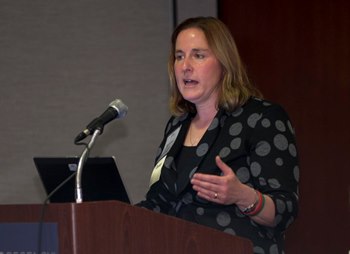The future of care delivery includes physician-led team-based care, so medical educators are working through how to train tomorrow’s physicians to effectively work with other health care professionals in care teams.
Addressing the AMA Section on Medical Schools during the 2014 AMA Annual Meeting, Lesley Bainbridge, PhD, director of interprofessional education (IPE) for the faculty of medicine at the University of British Columbia, made the case for team-based care. Bainbridge explained that while medical school curriculum needs to include IPE, there still are questions about how implementation challenges can best be overcome.
“Patterns of practice are developed in the education programs,” Bainbridge said. “It’s too late once health care professional students graduate. It’s necessary to address interprofessional care.”
But there’s no one-size-fits-all way for schools to implement such curriculum. For example, some medical schools don’t have many students in other health professions on campus and may need to bus students to different schools in order to facilitate team-based care education.
Even if a medical school shares a campus with other health professions, there are additional challenges—carving out time in schedules for collaborative classes, determining how tuition flows to such classes and securing buy-in from the deans of all schools.
The 11 grant schools of the AMA’s Accelerating Change in Medical Education initiative now are puzzling through these challenges and testing new solutions to later disseminate to all medical schools.
Maryellen Gusic, MD, executive associate dean of educational affairs at Indiana University School of Medicine (pictured left), shared the way her school was participating in the initiative, including the creation of the IU Center for Interprofessional Education and Practice.
The goal of the center is to implement, integrate and evaluate IPE programs and exemplary practice sites, then to translate the outcomes of IPE into collaborative practice models. IU’s health schools are undertaking collaborative space planning to figure out the best locations on the school’s various campuses for IPE classes to take place.
In the meantime, Bainbridge has some core ways to make team-based care part of training:
- Start socializing health professions students early
- Embed interprofessional education into curricula in all health professions schools
- Create value for interprofessional education that students can see and relate to
- Learn to assess whether team-based care education is working
- Build capacity for ongoing scholarship in this arena, such as doctoral students interested in developing the idea further




